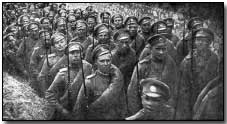Feature Articles - The Minor Powers During World War One - Russia
 Although not technically a "minor power",
Russia's part in the Great War is often forgotten. In an alliance with
Britain and France, Russia also saw itself as the champion of the Slav
peoples in their struggle for independence, first from the Turks, then from
the Austrians.
Although not technically a "minor power",
Russia's part in the Great War is often forgotten. In an alliance with
Britain and France, Russia also saw itself as the champion of the Slav
peoples in their struggle for independence, first from the Turks, then from
the Austrians.
When Austria declared war on Serbia, Germany declared war on Russia. This was due to the alliance system whereby a war involving one of the members of the alliance would draw in the others.
After initial Russian successes, particularly against the Austrians in Galicia, the under-equipped and poorly-led Russian army was driven back, especially after the disaster at Tannenberg in East Prussia in August 1914. More than 30,000 Russian soldiers were killed in that battle alone.
From January to November 1915, the advancing Germans and Austrians pushed the Russian army ever further back inside their own borders, threatening Minsk and Riga. Similarly, Russia attacked Turkey and made initial gains before being driven back.
In March 1917, after much unrest within Russia, Tsar Nicholas II abdicated. The new provisional government promised to continue the war despite the demands of the Bolsheviks, speaking for the people of Russia, weary of the war.
The Germans allowed prominent Bolsheviks like Lenin and Trotsky to pass by a sealed train from Switzerland into Russia, in order to start a revolution and knock Russia out of the war.
The final Russian offensive on the Eastern Front took place in July 1917. However, the Russian military effort was gravely hampered by Finns, Estonians, Latvians, Ukrainians and Poles demanding their independence.
 Instead
of an offensive, thousands of troops threw down their weapons and fled from
the war zone.
Instead
of an offensive, thousands of troops threw down their weapons and fled from
the war zone.
Many of them were shot by loyal troops on the government's orders. In the Russian Navy's home port, Kronstadt, Sailors and factory workers demonstrated for an end to the war. In August, Muscovite factory workers did the same. Finally, the "October Revolution" occurred. Fighting stopped along the entire eastern front.
The Bolshevik leaders signed the Treaty of Brest-Litovsk, whereby German troops occupied great swathes of Western Russia, including most of the Ukraine, the Baltic states and the South of Finland (who gained her independence).
Meanwhile, British troops arrived at Murmansk and Archangelsk to attempt to fight the Bolsheviks and restore the Tsarist government. The attempt at intervention failed and the Bolshevik forces won the ensuing civil war.
Some 1,700,000 Russian soldiers died in action during World War I. Figures are unavailable of civilian casualties, but the civil war was accompanied by famine and a bitter winter.
Ack Ack was a term used to describe anti-aircraft fire.
- Did you know?
